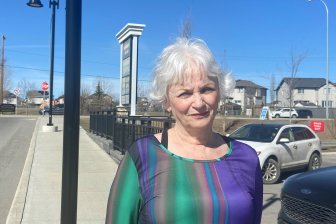Proposed Renter’s Bill of Rights a good first step, but not enough for Alberta: advocate | Globalnews.ca

[ad_1]
The federal government’s proposed housing reforms are a good first step but are not enough for Alberta, a housing advocate said.
Jessica Bird, a Calgary resident, has been living in her apartment for the last four years. When her family first moved into the then-renovated unit, the rent was $1,075 a month, everything included. The landlord increased her rent to $1,300 last March.
When Bird renewed her lease in April this year, she was told she could only sign a three-month lease because her landlord wanted to see what the rental market would be like come July 1. Bird told Global News that the landlord said rent would be increased by another $700 to $900 a month, which means the apartment would potentially cost Bird and her family $2,100 a month.
“I don’t think we’ll be able to afford $2,100 a month. If we were able to afford that, then we could get a mortgage,” she said.
Bird said she’s been looking for other places to rent for the past year but everything is out of her budget. According to a report by the Canada Housing and Mortgage Corporation, the average rent for a two-bedroom apartment is 1,695 a month, up by 14.3 per cent year over year.
Bird said she considered buying an RV and winterizing it if she needed to.
“I see a lot more homeless people. I see a lot more unhoused people. I see a lot more people needing social services, and I really feel bad for the parents out there with kids. My husband and I will survive, but if we had young ones, I have no idea what we would even do,” she said.
Breaking news from Canada and around the world
sent to your email, as it happens.
Bird said she isn’t sure if rent caps will work in Alberta because a program like that has never existed in the province, but did say the affordable housing crisis is saddening.
Prime Minister Justin Trudeau announced last month three new proposed reforms in the 2024 budget that aim to protect Canadian renters and help them break into the housing market. They include amending the Canadian Mortgage Charter to allow tenants to count on-time rent payments toward their credit score, and proposing $15 million in new funding to provincial legal aid organizations to protect tenants against unfair rent payments.
The federal government is also proposing a new Canadian Renter’s Bill of Rights, which would require landlords to disclose the history of a property’s pricing so renters can bargain fairly.
Trudeau says the bill will “crack down on renovictions, create a nationwide standard lease agreement, and give renters more agency.”
Dale Whitmore, director of policy and law reform at the Canadian Centre for Housing Rights, said the reforms “reflect the rights and needs that renters have across the country.”
According to Whitmore, renter protections are “patchwork” and vary depending on which province or territory you live in.
“There’s nowhere in Canada (where renter protections) are really adequate, so we do think it’s a great step,” he told Global News. “It’s important that the federal government take it seriously and work with renters to make sure that actually does provide those protections.”
Whitmore said Alberta has some of the fastest rent increases in Canada, due in large part because there aren’t any rent caps. Currently, there is no limit to what landlords can charge and increase for rent.
“(Rent caps) are one of the things that are essential. What is included in the Renter’s Bill of Rights is a right to reasonable rent and protection against excessive rent increases,” he said.
“It’s not going to be a surprise to anyone that we’re in an affordable housing crisis in Canada. We’re reaching the point where literally half of renters in Canada are worried about being able to pay their rent, and that’s only getting worse.”
But Whitmore said the proposed solutions won’t immediately solve the complex problem. He said provinces are still the ones who have to adapt the new national standard.
“It’s a long road, potentially, but it’s worth it, too, because renters aren’t going to settle for anything less at this point,” he said.
“(The federal announcement) announced what they’re calling a comprehensive plan and they’ve gone into a fair amount of detail already as to what it’s going to look like. So what we’re seeing is there’s some good news. The fact that they’re looking at housing and all for the first time in decades is good news.
“It’s well and good to build more housing, but the amount of the plan that’s devoted to affordable housing is not adequate to the need. And we’d like to see a lot more of that to match the focus on supply.”
— with files from Naomi Barghiel, Global News
© 2024 Global News, a division of Corus Entertainment Inc.
[ad_2]


